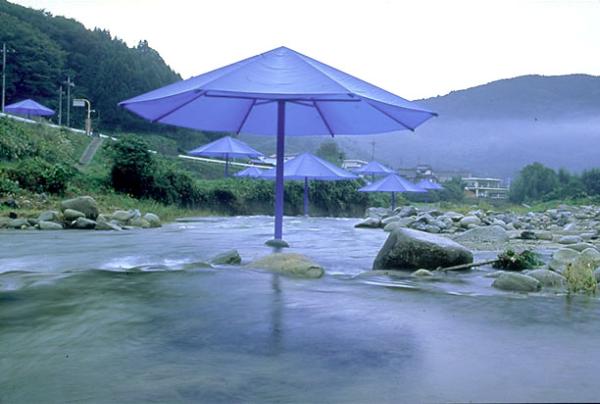Christo Gallery
This Japan-USA temporary work of art reflected the similarities and differences in the ways of life and the use of the land in two inland valleys, one 19 kilometers (12 miles) long in Japan, and the other 29 kilometers (18 miles) long in the USA.
In Japan, the valley is located north of Hitachiota and south of Satomi, 120 kilometers (75 miles) north of Tokyo, around Route 349 and the Sato River, in the Prefecture of Ibaraki, on the properties of 459 private landowners and governmental agencies.
In the U.S.A., the valley is located 96.5 kilometers (60 miles) north of Los Angeles, along Interstate 5 and the Tejon Pass, between south of Gorman and Grapevine, on the properties of Tejon Ranch, 25 private landowners as well as governmental agencies.
Eleven manufacturers in Japan, USA, Germany and Canada prepared the various elements of The Umbrellas: fabric, aluminum super-structures, steel frame bases, anchors, wooden base supports, bags and molded base covers. All 3,100 umbrellas were assembled in Bakersfield, California, from where the 1,340 blue umbrellas were shipped to Japan.
Starting in December 1990, with a total work force of 500, Muto Construction Co. Ltd. in Ibaraki, and A. L. Huber & Son in California installed the earth anchors and steel bases. The sitting platform / base covers were placed during August and September 1991.
From September 19 to October 7, 1991, an additional construction work force began transporting The Umbrellas to their assigned bases, bolted them to the receiving sleeves, and elevated the umbrellas to an upright closed position. On October 4, students, agricultural workers, and friends, (960 in USA and 920 in Japan,) joined the work force to complete the installation of The Umbrellas. Each umbrella was 6 meters (19 feet 8 inches) high and 8.66 meters (26 feet 5 inches) in diameter.
The artists entirely financed their 26 million dollar temporary work of art through The Umbrellas, Joint Project for Japan and U.S.A. Corporation (Jeanne-Claude Christo-Javacheff, president). Previous projects by the artists have all been financed in a similar manner through the sale of the studies, preparatory drawings, collages, scale models, early works, and original lithographs. The artists do not accept any sponsorship.
The removal started on October 27 and the land was restored to its original condition. The Umbrellas were taken apart and all elements were recycled.
The Umbrellas, free standing dynamic modules, reflected the availability of the land in each valley, creating an invitational inner space, as houses without walls, or temporary settlements and related to the ephemeral character of the work of art. In the precious and limited space of Japan, The Umbrellas were positioned intimately, close together and sometimes following the geometry of the rice fields. In the luxuriant vegetation enriched by water year round, The Umbrellas were blue.
In the California vastness of uncultivated grazing land, the configuration of the umbrellas was whimsical and spreading in every direction. The brown hills are covered by blond grass, and in that dry landscape, The Umbrellas were yellow.
From October 9th, 1991 for a period of eighteen days, The Umbrellas were seen, approached, and enjoyed by the public, either by car from a distance and closer as they bordered the roads, or by walking under The Umbrellas in their luminous shadows.
Umbrellas:
How man in Japan (blue): 1340
How many in USA (yellow): 1760
Height including base: 19ft 8" 1/4 6 meters
Diameter of Umbrellas: 28 ft 5 inches 8.66 m
Weight of Umbrellas without base: 448 pounds 203.2 kg
Fabric area supported by Umbrella: 53.17 ft2 59.3m2
Aluminum:
Diameter of Pole: 8.625 inches 21.9 cm
Length of Ribs: 15 ft 7" 3/4 4.77 m
Size of Ribs: 3.75" x 2.25" 9.5 x 5.7 cm
Length of Strut: 7 ft 5" x 11/32 227m
Diameter of Strut: 3 inches 7.6 cm
Bases:
How many steel-bases in USA: 1625
How many concrete-bases in USA: 135
How many steel-bases in Japan: 1205
How many concrete-bases in Japan: 35
How many river-bases in Japan: 100
Totals for both Japan and U.S.A.:
Paint: 2,000 gallons 7,600 liters
Total length Poles: 10.97 miles 17.7 km
Total number of Ribs: 24,800
Total length Ribs: 73.5 miles 118.3 km
Total number of Struts: 24,800
Total length Struts: 35 miles 56.3 km
Total number of pieces per Umbrella: 470
Total number of pieces per steel-base with anchors: 64
Total number of all pieces: 1,655,400

viewer |
|
|
| Reichstag Wrapped |
| Running Fence |
| Valley Curtain |
| Pont Neuf Wrapped |
| Wrapped Coast |
| Surrounded Islands |
Umbrellas |
Biography
Bulletin Board
Renowned Art
(home)
Christo was born in Gabrovo, Bulgaria. He studied at the Fine Arts Academy in Sofia from 1953 to 1956, when he moved to Prague. In 1957 Christo escaped to Vienna where he lived briefly before moving to Paris. Christo began his wrapped objects in Paris in 1958.
all artists, with thumbnails: by birth year | alphabetically
all artists: by birth year | alphabetically
artists born in the 13th 14th 15th 16th 17th 18th 19th 20th century